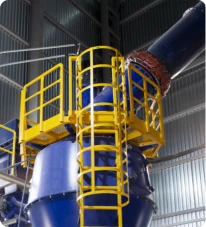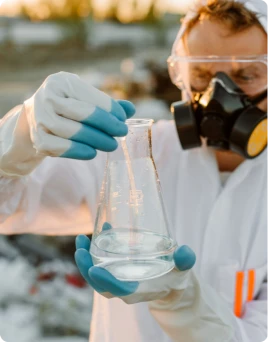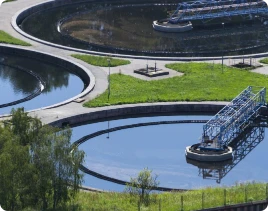Utilities and wastewater management services
City and County utilities, water treatment, wastewater treatment, and sewage treatment plants represent an extremely important role in society, and help to maintain clean water and energy so our communities thrive while minimizing their impact on the environment.
Efficient wastewater management not only safeguards public health but also safeguards our ecosystems and conserves this precious resource for future generations.


Ensuring clean water: Responsible management of city and county lab chemicals
Chemicals are used daily in city and county laboratories and wastewater treatment plants for water testing to ensure that drinking water released from the plant is safe and within regulatory parameters.
The proper and timely disposal of these spent chemicals is extremely important to ensure that we can build a more sustainable tomorrow.
Wastewater management solutions for city and County utilities
Here are some of the ways we can assist City and County utilities, water treatment, wastewater treatment, and sewage treatment plants:
1
Transportation and disposal of spent COD vials
COD Vials (or chemical oxygen demand) is a water and wastewater parameter that measures the amount of a specified oxidant.
Operators frequently use this test method, and generate vials of water samples that are contaminated with chemicals used during the testing process.
2
Transportation and disposal of mercury containing devices
The devices are fragile, and if broken, can release liquid mercury which can be extremely harmful if not handled properly and cleaned up quickly.
Facilities should strongly consider disposing of these devices to avoid contaminant or safety issues in the future.
3
Transportation and disposal of lab reagents
Water and Wastewater Treatment Plants are often tasked with using multiple reagents or test methods to ensure the water released to the public is within regulatory parameters.
Each test method must be followed exactly, and the residual chemical must be disposed of properly.
4
Transportation and disposal of universal waste
Like any operating facility, city and county utilities and laboratories generate universal waste such as used fluorescent bulbs, batteries, and aerosol cans. It is imperative that these items are recycled, or disposed of properly.
Some fluorescent bulbs contain mercury, and have to be treated as hazardous waste if they are crushed or broken.
Highlighted Services
- Wastewater, Wash water, and Rinsewater Disposal
- Wastewater Management
- Wastewater Removal
- Wastewater Transportation
- Wastewater Disposal
- Wastewater Recycling
- Disposal of COD Vials
- Disposal of mercury and mercury thermometers

Latest News

Manufacturing plants, laboratories, hospitals, government agencies, and other facilities that use potentially hazardous chemicals can all benefit from using a lab pack service. While there have been strict regulations regarding…

Chemical waste is produced in laboratories on a regular basis, however, not all of this waste is hazardous. Certain chemicals are allowed to be disposed of with regular garbage or…

Chemical waste disposal methods are regulated by the EPA (Environmental Protection Agency) through the RCRA (Resource Conservation and Recovery Act.) Chemical waste cannot be disposed of through regular trash or…